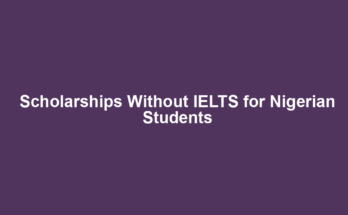Securing a PhD scholarship can be a major step toward achieving advanced academic goals, but standardized testing requirements like the GRE can be a barrier for some applicants. Fortunately, numerous universities and organizations offer PhD scholarships without requiring GRE scores, making it easier for students worldwide to pursue higher education. In this guide, we’ll cover everything you need to know about these scholarships, including eligibility, top programs, tips for applying, and common FAQs.
1. Why Choose PhD Scholarships Without GRE?
PhD scholarships without GRE requirements offer a more accessible pathway for students who may not have the resources or desire to take standardized tests. These scholarships are typically awarded based on academic merit, research experience, and professional achievements rather than test scores. Key benefits include:
- Cost Savings: The GRE and preparation can be costly, and no-GRE scholarships eliminate this financial burden.
- Reduced Stress: By focusing on academic and research skills, applicants can avoid the pressure of high-stakes testing.
- More Holistic Evaluation: No-GRE scholarships often emphasize a candidate’s overall profile, including academic performance, research, and work experience.
Choosing scholarships without GRE requirements can open doors for students who have demonstrated skills but may not excel in standardized tests.
2. Types of PhD Scholarships That Don’t Require GRE
Several types of PhD scholarships do not require GRE scores. Here are some common categories:
- University-Specific Scholarships: Many universities, particularly outside the U.S., do not mandate GRE scores for PhD admissions, especially in Europe and Asia.
- Research-Based Scholarships: Programs with a strong research focus may prioritize prior research experience over standardized testing.
- Field-Specific Scholarships: Fields like humanities, social sciences, and education often have fewer GRE requirements compared to STEM fields.
- Need-Based Scholarships: Certain need-based programs prioritize financial needs and academic background, with less emphasis on standardized testing.
3. Top Countries and Universities for No-GRE PhD Programs
Several countries have universities and institutions offering PhD programs that don’t require GRE scores, focusing instead on academic achievements and research proposals.
- United Kingdom: Most UK universities, including prestigious institutions like the University of Oxford and the University of Cambridge, don’t require GRE for PhD programs. Scholarships such as the Commonwealth Scholarship and the Rhodes Scholarship are available for international students.
- Canada: Canadian universities like the University of Toronto and the University of British Columbia emphasize research experience over GRE scores for PhD admissions.
- Australia: The Australian National University and the University of Melbourne offer no-GRE PhD scholarships, such as the Australian Government Research Training Program.
- Germany: Known for its strong research programs, Germany has several universities that don’t require GRE scores, especially for students with a strong academic record.
- Singapore: Institutions like the National University of Singapore and Nanyang Technological University offer PhD scholarships based on research potential rather than standardized test scores.
4. Top PhD Scholarships Without GRE Requirements
Below is a list of prominent PhD scholarships that do not require GRE scores, along with their eligibility criteria, award details, and application deadlines.
1. Commonwealth Scholarship (UK)
- Eligibility: International students from Commonwealth countries
- Award: Covers full tuition, airfare, and living expenses
- Fields: Various fields
- Deadline: Usually around December
2. DAAD Scholarships (Germany)
- Eligibility: International students pursuing research in German institutions
- Award: Monthly stipend, insurance, travel allowance
- Fields: Broad range of fields
- Deadline: Varies by program
3. Research Training Program (RTP) Scholarships (Australia)
- Eligibility: International and domestic students at Australian universities
- Award: Covers tuition fees and a stipend for living expenses
- Fields: Various fields
- Deadline: Varies by university
4. Vanier Canada Graduate Scholarships (Canada)
- Eligibility: Canadian citizens, permanent residents, and international students
- Award: $50,000 per year for three years
- Fields: Various fields, particularly health, natural sciences, and engineering
- Deadline: November each year
5. Eiffel Excellence Scholarship (France)
- Eligibility: International students applying to French institutions
- Award: Monthly allowance, travel costs, health insurance
- Fields: Engineering, sciences, humanities, social sciences
- Deadline: January each year
6. Swiss Government Excellence Scholarships (Switzerland)
- Eligibility: Foreign researchers and artists
- Award: Monthly stipend, health insurance, tuition waiver
- Fields: Various fields
- Deadline: Varies by country
7. Singapore International Graduate Award (SINGA)
- Eligibility: International students with excellent academic records
- Award: Full tuition, monthly stipend, airfare grant
- Fields: Science and engineering
- Deadline: June and December
These scholarships prioritize academic potential and research ability over standardized testing, providing opportunities for students from diverse backgrounds.
Related:
5. How to Increase Your Chances of Securing a No-GRE PhD Scholarship
Applying for PhD scholarships without GRE requirements can be competitive, so it’s essential to strengthen your application in other areas. Here are some tips:
- Focus on Research Experience: Highlight your research accomplishments, published papers, and relevant projects. Universities value practical experience and contributions to the field.
- Craft a Strong Research Proposal: A well-defined research proposal that aligns with the scholarship’s objectives can make your application stand out.
- Obtain Excellent Recommendation Letters: Seek recommendation letters from professors or professionals who can attest to your research abilities, critical thinking skills, and academic potential.
- Prepare a Comprehensive CV: Include all academic achievements, work experience, internships, and other relevant information to showcase your qualifications.
- Tailor Your Statement of Purpose: Clearly express your motivation for pursuing a PhD, your career goals, and how the scholarship aligns with your aspirations.
Focusing on these areas can demonstrate your readiness and commitment to academic research, strengthening your candidacy for a no-GRE PhD scholarship.
6. FAQs About PhD Scholarships Without GRE
Q1: Are no-GRE PhD scholarships available for all fields of study?
While scholarships without GRE requirements are common in many fields, some disciplines, particularly in STEM, may still have standardized testing requirements. It’s essential to check each scholarship’s specific criteria.
Q2: How competitive are no-GRE PhD scholarships?
No-GRE scholarships can be highly competitive as they attract many applicants. However, with a strong application that emphasizes research experience and academic achievements, you can improve your chances.
Q3: Can I apply for a no-GRE scholarship if I’ve already taken the GRE?
Yes, you can apply to no-GRE scholarships even if you’ve taken the GRE. These scholarships simply don’t require you to submit scores, but they don’t exclude applicants who have them.
Q4: Are there specific deadlines for no-GRE PhD scholarships?
Yes, deadlines vary depending on the scholarship provider and university. Most scholarships have annual deadlines, so start preparing early to meet all requirements.
Q5: Can international students apply for PhD scholarships without GRE requirements?
Absolutely. Many no-GRE scholarships are open to international students, particularly those offered by universities and government programs in Canada, Europe, and Australia.
Conclusion
Pursuing a PhD without the GRE opens opportunities for students who have a strong academic and research background but may not excel in standardized testing. With numerous scholarships available that do not require GRE scores, students can achieve their academic goals without the added barrier of an entrance exam. Whether you’re aiming for a research-intensive program in Europe or a diverse institution in Canada, this guide provides a roadmap to finding the right scholarship.

